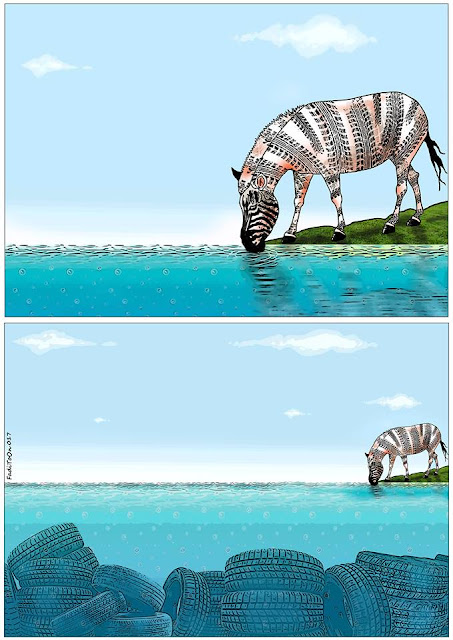"At the end of the day we all live on this earth together"
 |
| Photo and video: Jacob Crawfurd/http://crawfurd.dk/ |
In late May Khalid Wad Albaih was in Copenhagen as the keynote speaker at the conference Communicating Worlds (2) by Timbuktu Fonden. Below is the video on our conversation on the stage, his words poignant and precise as always:
Below are but two excerpts of his words. Little Omran Daqneesh in the ambulance in Syria was a symptom of our social media with Khalid reflecting on own principles as a cartoonist of getting caught in the race of keeping up:
"I realized that news became my fashion. What is hot today. Omran is hot today. Tomorrow is something else. We can't do something on Omran today and tomorrow, this is left behind. The media and I find myself running with them in this hamster-wheel, so am I creating change or am I just part of this ongoing take away-news? What am I doing?"
 |
| Khalid Wad Albaih, August 18, 2016. |
"Because I work on social media, because of the fact that you have to be now, you have to be there now, you have to think what you will do now, because nobody takes time to reflect. It is all about now".
"If you notice, there are keywords. Oh, the refugee crisis, so now everything has to be about the refugee crisis. You have to write and you have to draw about the refugee crisis. What is the refugee crisis nobody knows, but this is a refugee crisis. For whom? Europe is taking a lot of refugees. No, actually the largest refugee camp is in Kenya, you know, this is not real. These things are just words. ISIS is bad. This is how people think of them, when you think about something, ISIS bad. It is literally like a Donald Trump tweet".
Note Khalid's use of tempo and repetition. His words are a piece of poetry, making that very stress come alive in his listeners that is our public life and its lack of memory.
 |
| Khalid Wad Albaih, March 26, 2015. "I did a lot of flags during the Arab Spring, trying to reflect the real identity of it. Flags as a whole is a really interesting subject". |
Within shortly, said lines become deadly weapons in the hands of insisting nationalists. With which Khalid stated his particularly beautiful final words:
"As humans we should really understand that we move. Things change. History is very important just because whoever is here now wasn't here 200 years ago. This will not last forever. I think people should look at humanity, not look at man-made issues"
The khartoons shown are courtesy of Khalid Wad Albaih / https://www.facebook.com/khalidalbaih/
The photo and video are courtesy of Jacob Crawfurd / http://crawfurd.dk/

